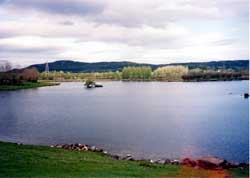British Waterways is set to launch a new fishery this summer in Lancashire, with its peaceful natural setting attractive to anglers old and new. The 25 acre former gravel pit is surrounded by eight acres of land designated as a nature site and home to migrating duck, geese and other birds for much of the year. It is also a Biological Heritage Site.
“We had to produce some innovative solutions which maintained the balance between wildlife environment and aspirations of the angling community,” said Mr Griffiths. The key lay in separating some bays from the main body of the lake to form dedicated angling pools, leaving the main body of water undisturbed. This was achieved by excavating rock and soil, creating a natural barrier between the newly formed pools and the main lake. There will be a total of eight pools where anglers can relax and pit their wits against an exotic range of aquatic foe in the form of pike, perch, tench, eels, barbel, dace, chub, golden orfe, koi and golden tench. The northern pool is further divided into three sections, housing less heavy bottom feeders. This will permit increased vegetation growth and provide good nesting conditions for the Tufted Duck, a visitor between March and June. The other four pools ranged from one to four acres in size, providing over 150 specially constructed fishing pegs. Each of these pools will be heavily stocked with a minimum of 2,000 small carp per acre. Each pool will have an adjacent car park with all weather pathways and tracks. FISHINGmagic Note |
Welcome!Log into your account













